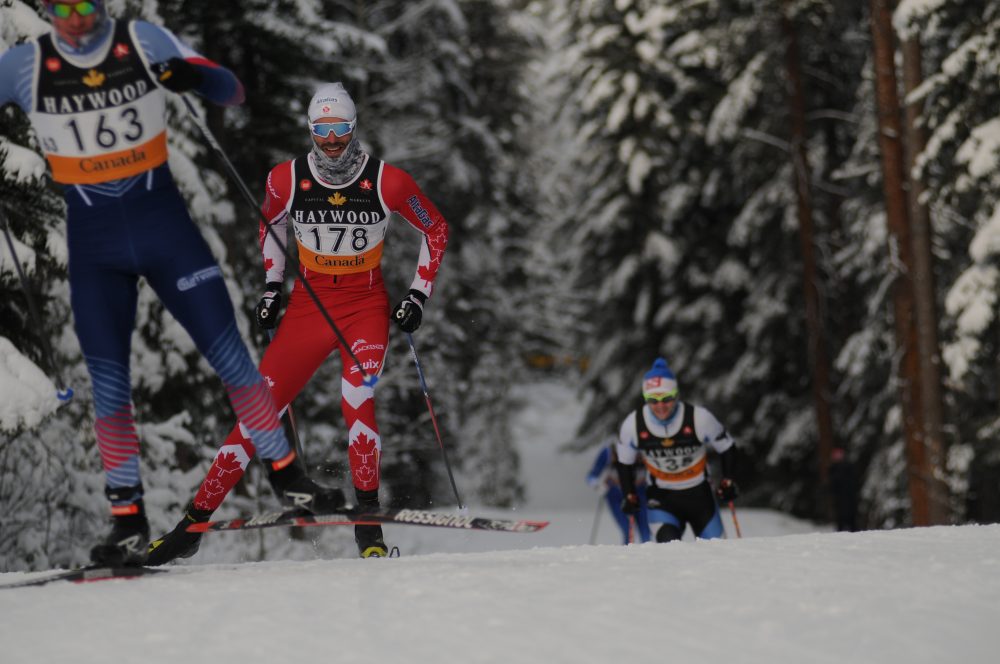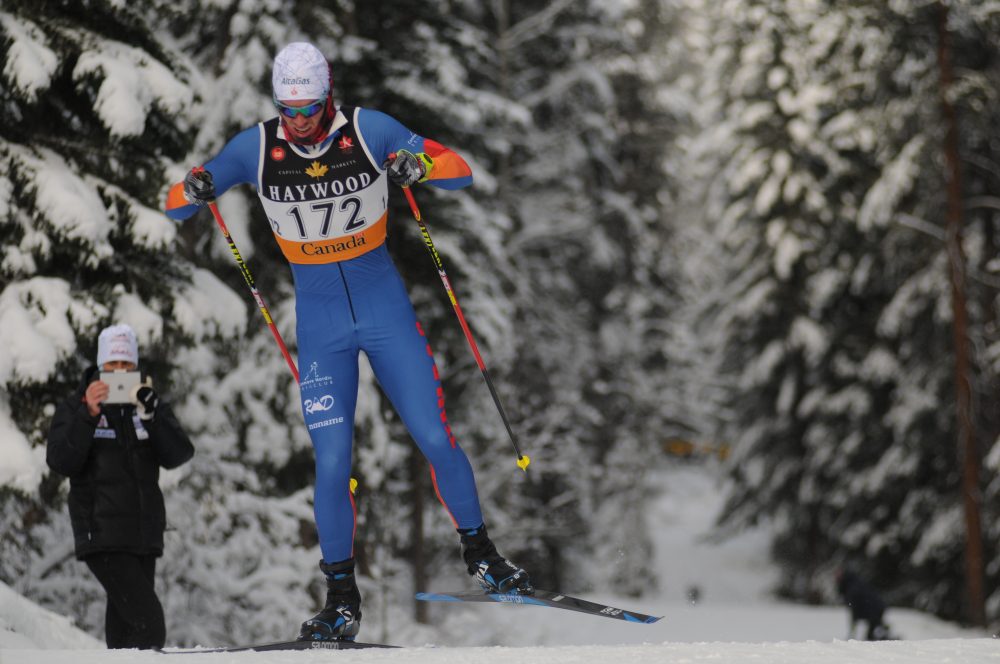
Frozen Thunder lived up to its name on Friday, with temperatures hovering below the legal race limit prior to the start of the second competition series of the week: the women’s 7.5- and men’s 10-kilometer freestyle individual starts.
An hour delay was enough time to see temperatures rise to -10 degrees Celsius (14 Fahrenheit), and many skiers bundled in Buffs in prep for the five to six laps of racing. Overcast skies were a celestial reminder of the nearly 18 centimeters of snowfall that Canmore, Alberta, had seen over the past three days, Mother Nature’s own personal pass at the center’s snow-farmed track.
Thirty-six athletes entered the women’s skating event, many of whom raced Wednesday’s classic sprint, including the sprint-final winner, Maya MacIsaac-Jones (Canadian U25 Team/Rocky Mountain Racers), American Chelsea Holmes of Alaska Pacific University (APU), Dahria Beatty of the Canadian World Cup Team and Alberta World Cup Academy (AIAWCA), Frédérique Vézina of the Pierre Harvey National Training Centre (CNEPH), and Annika Hicks (AIAWCA).
Covering the women’s five-lap race in a time of 21:26.6 minutes was Holmes for first place.
With her husband working and living in Banff, Alberta — a 20-minute drive from Canmore — competing in the Frozen Thunder races for Holmes was not just about getting some races in before the start of the season, but also spending time with her husband before flying to Europe.
“I have Period 1 starts this year, which I’m super excited about, but it’s definitely a bit of time of the road,” Holmes said on the phone after the race. She earned those November/December World Cup starts as the overall leader of the U.S. SuperTour circuit last season.
“I just figured this time of year and I needed to spend some time with Luke and not be traveling too much, which was a hard decision to make,” she continued. “Part of me really wanted to go back to Alaska for a while, but to be a little bit more mellow and to be here was super important to me.”
Holmes, 30, plans to head to Finland on Nov. 15, where she will meet with the U.S. Ski Team and prep for the World Cup opener in Kuusamo. Frozen Thunder presented an opportunity to race against fellow North Americans before competing abroad.
“You push yourself so much harder than you do in intervals,” she said of her decision to race both Wednesday’s sprint and Friday’s distance event. “Even like a time trial by yourself. It changes it when you put a bib on.”

Emerging as the top Canadian was Beatty in second place, 34.4 seconds back from Holmes’s winning time. Though Holmes started before her and Beatty received splits off her time, Holmes created a time gap on her competitors with more than two-thirds of racing remaining.
“Chelsea was strong today, she started really fast and had given herself a big lead after the first two laps,” Beatty wrote in an email. “My goal for the distance race today was to push hard from the start and focus on using as much one skate [V2] as possible and having smooth transitions. I was happy with how I skied today and I am excited to build on how I felt today over in Europe.”
With Beatty’s next stop being Gällivare, Sweden, for a weekend of International Ski Federation (FIS) races, both the Frozen Thunder sprint — in which she only raced the qualifier — and distance race served as tools to remind Beatty of her race-pace mentality on snow.
“Frozen Thunder races are always a great way to get into the race mindset at home before heading over to Europe,” she wrote. “For Wednesday’s sprint race I made the decision with my coach beforehand to only do the qualifier. Having returned from Park City only one week before I didn’t want to stress my systems too much too soon. The qualifier went well for me. I made few small mistakes that often come with the first race of the season but I was able to give a solid effort that I was happy with.”
She won Wednesday’s qualifier by 8.56 seconds over Holmes, the second-fastest female qualifier.
Rounding out the podium in the women’s distance race was Canadian World Cup Team member Emily Nishikawa in third (+53.0). Hicks, who was second in Wednesday’s sprint final, placed fourth (+1:38.8) and junior India McIsaac (Canadian Junior National Team/Rocky Mountain Racers) claimed fifth (+1:50.0) overall.

In the men’s 10 k that followed, 68 skiers started the six-lap race, many of whom were also repeats from Wednesday’s sprint, including Canadian World Cup Team member Len Valjas, Dominique Moncion-Groulx (AIAWCA), Andy Shields (Lappe Nordic), Russell Kennedy (Team R.A.D.), Bob Thompson of the Thunder Bay National Team Development Centre (NTDC), and Julien Locke (U25 Team/Black Jack), who won Wednesday’s qualifier to earn start rights with Canada’s Period 1 World Cup team.
Doubling up on his wins for the week (he also won Wednesday’s sprint final), Valjas raced to first in the men’s distance race, covering the course in a time of 22:13.2. Valjas, who plans to depart for Gällivare, Sweden, on Nov. 11, explained that Frozen Thunder was the perfect last stop before heading to Europe.
“I chose to compete in the Frozen Thunder races because it’s a great stress-free chance to ski hard and shake some of the rust off from summer training,” Valjas wrote in an email. “It always takes a few good hard efforts for me to feel good again. I was very happy with both of my races.
“My goals for the early season are to try and race as many distance and sprint races as I can. I find racing is the best training I can do,” he continued. “Even as a sprint specialist, I have had my best seasons when I have entered all the distance races early in the season. Even if they don’t go well, the training I get from them pays off later.”
Taking second place, 6.2 seconds off Valjas’s time was American Rogan Brown of the Sun Valley Ski Education Foundation. Kennedy took the final podium spot in third (+11.4), Shields placed fourth (+18.1), Canadian World Cup Team member, Knute Johnsgaard finished fifth (+24.9).
“I was hoping for a podium in today’s race and just some sprint practice/ good intensity in the sprint,” Kennedy wrote in an email. “I started maybe a little on the hard side but I was right in the mix the whole race and really just lost the lead the last two laps. It would have been nice to have a ride but I was pretty much solo the whole race. That was good practice for me since I had to just pace myself and push hard the whole time. My fitness feels right on where I would like it to be and now I just have to find a couple extra gears before I leave!”

Gabby Naranja
Gabby Naranja considers herself a true Mainer, having grown up in the northern most part of the state playing hockey and roofing houses with her five brothers. She graduated from Bates College where she ran cross-country, track, and nordic skied. She spent this past winter in Europe and is currently in Montana enjoying all that the U.S. northwest has to offer.



